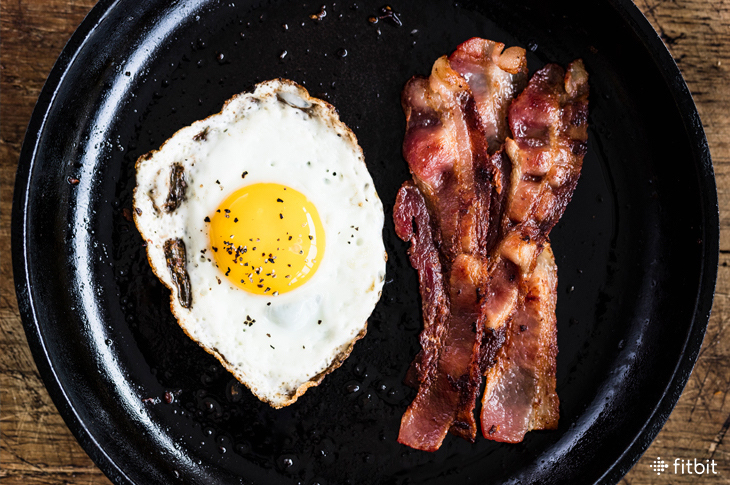
Could switching your morning oats for bacon and eggs, and your skinny latte for buttered coffee, make you a better athlete? From ultra-marathoners to body builders, athletes are ditching carbs in favor of fats, and lots of them. The ketogenic or low-carb high-fat diet drastically cuts carbs to less than 50 grams a day (the amount in just one bagel) and focuses primarily on fat for 75 to 80 percent of calories. That means plates filled with sausages, eggs, cheese, and avocado, but otherwise no fruit, grains, beans, or sweet potato, and absolutely no sugar or booze. This isn’t exactly new—it’s been around for almost a century as a potential treatment for epilepsy, and Dr. Atkins made it famous for weight loss. But now, with the rise of caveman eating and a fading fear of fat, a “keto” revival seems to be happening.
The big question: Will a ketogenic diet actually boost your performance or help you shave seconds off your race time?
Why Turn to Fat for Fuel?
When you eat very little carbohydrate for a few days, your body eventually becomes starved of glucose, and goes into “ketosis”—a process that converts fat to ketones. Ketones can power the brain, heart, and muscles when carbs are in short supply. Even the leanest athlete has a lot more stored fat than carbohydrate, so the hope is that by continuing to restrict carbs, you can train your body to burn fat more efficiently. Ultra-endurance runners and cyclists love the diet, as it means not having to rely on sugary gels, chews, and sports drinks, and having a much larger fuel reserve to tap into during the long events. That sounds good in theory, but the science may not stack up in its favor.
What the Science Says
Tim Noakes, emeritus professor at the University of Cape Town in South Africa, is a strong proponent of the ketogenic diet. He argues, “Many athletes need to realize that optimum fueling for sport isn’t simply a question of eating as much carbohydrate as possible—before, during and after exercise.” Noakes believes carbs are the problem, and fat is the solution, not only for better sports performance, but for obesity and diabetes, too.
Louise Burke, sports dietitian and head of nutrition at the Australian Institute of Sports, suggests it’s more complicated. Burke has examined high fat diets for sports performance a couple of times, and each time concluded, “High-fat diets don’t improve performance in sports in which athletes need to be able to work at high intensities, even if it’s only for a short time.” Burke explains, burning fat requires more oxygen than burning carbs, so the keto diet only appears to work when you’re exercising at a low to moderate intensity (60 to 70 percent VO2 Max). As soon as you start pushing the intensity of your workout to the level where you’re puffing for breath (80 or 90 percent VO2 Max), your physical and mental performance suffer.
Not wanting to leave any stone unturned, Burke recently took a closer look at the effects in athletes who compete at low to moderate intensity—elite walkers. She found that walkers who ate carbs showed improved race times, whereas walkers fueling on fat did not. “The downside to a keto diet is that it reduces your muscles’ capacity to use carbohydrate, so when you do need to put in that little bit of extra effort to get over the finish line, you may not be able to,” says Burke.
The Verdict
If you’re looking for a sub two-hour marathon, the keto diet is probably not your best bet. But if winning the race is not your goal, there’s no harm in training your body to use fat as another fuel source—it may enable you to chug along for longer. Burke’s advice: “Don’t think of your diet as a battle of ‘fats versus carbs,’ but rather a war in which soldiers on all sides are ready to work together in the fight to win.” A more moderate approach would be to match or “periodize” your carb intake with how hard you’re training: On heavy training days eat more carbs and on rest days eat fewer. But whatever you do, take the healthy approach by getting most of your fats from plant sources, such as extra-virgin olive oil, avocado, nuts, and seeds, rather than butter, salami, and cream.
This information is for educational purposes only and is not intended as a substitute for medical diagnosis or treatment. You should not use this information to diagnose or treat a health problem or condition. Always check with your doctor before changing your diet, altering your sleep habits, taking supplements, or starting a new fitness routine.

I was researching the KetoDiet diet for my sister with NUT midline carcinoma. I read that it is also being used to help with dementia and Alzheimer’s disease. I started it 10 days ago because our mom died with an unknown dementia at 69. Is there more I should know?
You might check out some of the keto FB groups. Very informative.
I had lost 270lbs, but have recently 6mos ago started going through full blown menopause & gaining weight no matter what I do. How do I stop this weight gain?